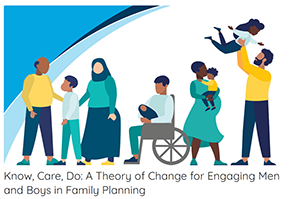
Know, Care, Do: A Theory of Change for Engaging Men and Boys in Family Planning
This course is intended for program implementers who are working to increase and improve the engagement of men and boys in FP programs and services. Course participants will deepen their understanding of what engaging men and boys in FP means and how programs and services can engage them in supportive, affirming, and gender equitable ways. Throughout this course, participants will familiarize themselves with the Know, Care, Do theory of change and case studies that guide the design and implementation of programs and services that engage men and boys in FP and sexual and reproductive health across their life course and across all levels of the socio-ecological model.
Organization/author: Breakthrough ACTION/Johns Hopkins Center for Communication Programs
Year: 2023Language: French, English
 Know Know about FP/SRH by having factual knowledge about FP/SRH services and methods and harmful gender norms and expectations.
Know Know about FP/SRH by having factual knowledge about FP/SRH services and methods and harmful gender norms and expectations. Care Care about FP/SRH by assuming responsibility for their personal health and reproduction and accountability for supporting their partners’ reproductive priorities and needs.
Care Care about FP/SRH by assuming responsibility for their personal health and reproduction and accountability for supporting their partners’ reproductive priorities and needs. Do Do supportive actions for FP/SRH by taking concrete steps to communicate and help achieve reproductive intentions and goals from themselves and in support of their partners.
Do Do supportive actions for FP/SRH by taking concrete steps to communicate and help achieve reproductive intentions and goals from themselves and in support of their partners.

